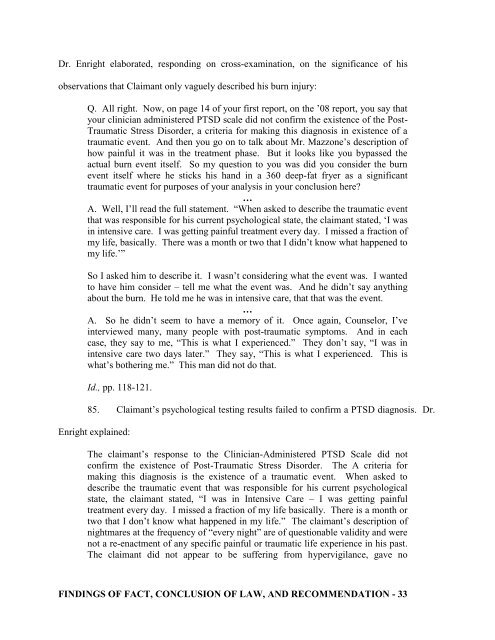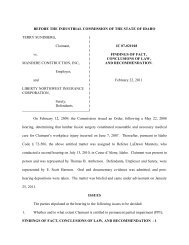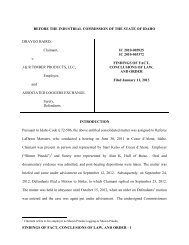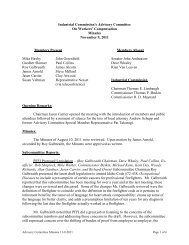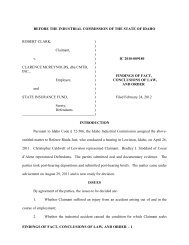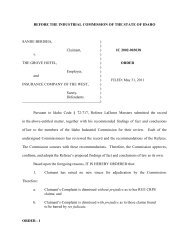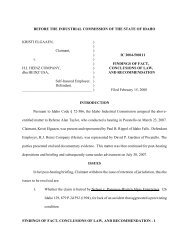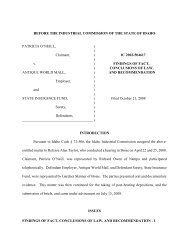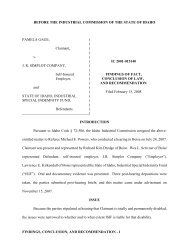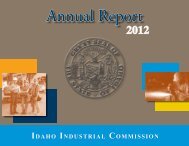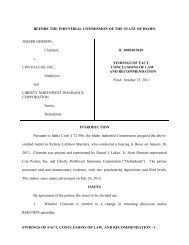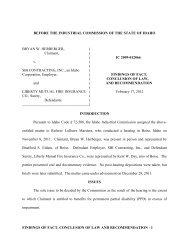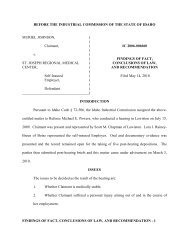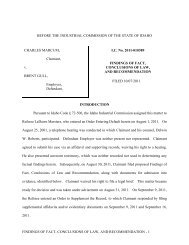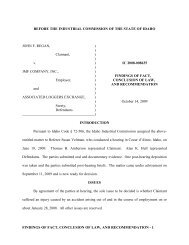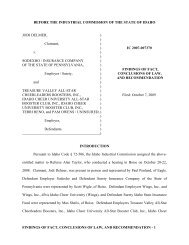Mazzone v. Texas Roadhouse, Inc. - the Idaho Industrial Commission!
Mazzone v. Texas Roadhouse, Inc. - the Idaho Industrial Commission!
Mazzone v. Texas Roadhouse, Inc. - the Idaho Industrial Commission!
Create successful ePaper yourself
Turn your PDF publications into a flip-book with our unique Google optimized e-Paper software.
Dr. Enright elaborated, responding on cross-examination, on <strong>the</strong> significance of his<br />
observations that Claimant only vaguely described his burn injury:<br />
Q. All right. Now, on page 14 of your first report, on <strong>the</strong> ‟08 report, you say that<br />
your clinician administered PTSD scale did not confirm <strong>the</strong> existence of <strong>the</strong> Post-<br />
Traumatic Stress Disorder, a criteria for making this diagnosis in existence of a<br />
traumatic event. And <strong>the</strong>n you go on to talk about Mr. <strong>Mazzone</strong>‟s description of<br />
how painful it was in <strong>the</strong> treatment phase. But it looks like you bypassed <strong>the</strong><br />
actual burn event itself. So my question to you was did you consider <strong>the</strong> burn<br />
event itself where he sticks his hand in a 360 deep-fat fryer as a significant<br />
traumatic event for purposes of your analysis in your conclusion here?<br />
…<br />
A. Well, I‟ll read <strong>the</strong> full statement. “When asked to describe <strong>the</strong> traumatic event<br />
that was responsible for his current psychological state, <strong>the</strong> claimant stated, „I was<br />
in intensive care. I was getting painful treatment every day. I missed a fraction of<br />
my life, basically. There was a month or two that I didn‟t know what happened to<br />
my life.‟”<br />
So I asked him to describe it. I wasn‟t considering what <strong>the</strong> event was. I wanted<br />
to have him consider – tell me what <strong>the</strong> event was. And he didn‟t say anything<br />
about <strong>the</strong> burn. He told me he was in intensive care, that that was <strong>the</strong> event.<br />
…<br />
A. So he didn‟t seem to have a memory of it. Once again, Counselor, I‟ve<br />
interviewed many, many people with post-traumatic symptoms. And in each<br />
case, <strong>the</strong>y say to me, “This is what I experienced.” They don‟t say, “I was in<br />
intensive care two days later.” They say, “This is what I experienced. This is<br />
what‟s bo<strong>the</strong>ring me.” This man did not do that.<br />
Id., pp. 118-121.<br />
85. Claimant‟s psychological testing results failed to confirm a PTSD diagnosis. Dr.<br />
Enright explained:<br />
The claimant‟s response to <strong>the</strong> Clinician-Administered PTSD Scale did not<br />
confirm <strong>the</strong> existence of Post-Traumatic Stress Disorder. The A criteria for<br />
making this diagnosis is <strong>the</strong> existence of a traumatic event. When asked to<br />
describe <strong>the</strong> traumatic event that was responsible for his current psychological<br />
state, <strong>the</strong> claimant stated, “I was in Intensive Care – I was getting painful<br />
treatment every day. I missed a fraction of my life basically. There is a month or<br />
two that I don‟t know what happened in my life.” The claimant‟s description of<br />
nightmares at <strong>the</strong> frequency of “every night” are of questionable validity and were<br />
not a re-enactment of any specific painful or traumatic life experience in his past.<br />
The claimant did not appear to be suffering from hypervigilance, gave no<br />
FINDINGS OF FACT, CONCLUSION OF LAW, AND RECOMMENDATION - 33


